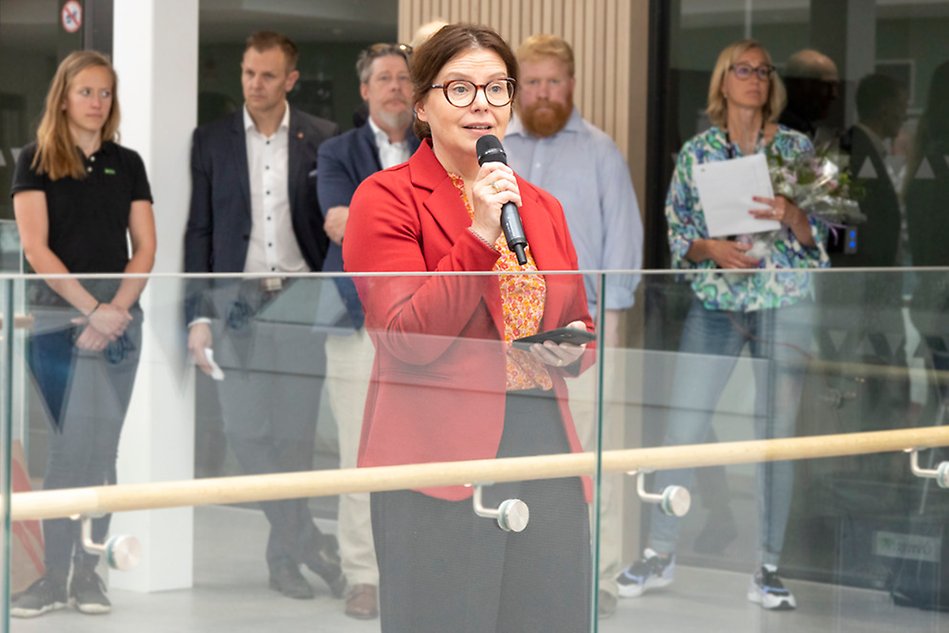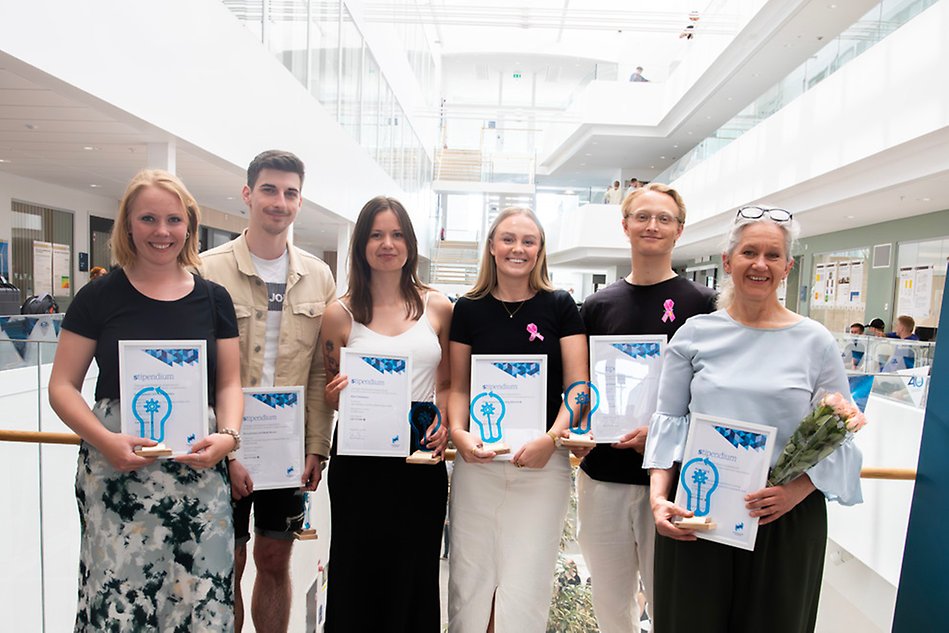Better public health in focus for innovative students
Again this year, students who wrote the most meritorious theses within the area health innovation at Halmstad University received scholarships from Getinge Sterilization Inc. Six happy students shared a total of SEK 100,000 which they received at the graduation fair, Utexpo, in June.
For the past three years, Halmstad University has had a strategic partnership agreement with Getinge Sterilization. The company annually awards scholarships in front of a large audience at the Utexpo scholarship ceremony. This year, four theses were rewarded with SEK 25,000 each.

Ingeborg Nilsson, Focus Area Leader of Health Innovation, welcomes representatives from Getinge Sterilization to the stage.
Engineering excellence in breast biopsy and bladder monitoring
Tilda Annervi and Ludvig Eberhardt, both from the Programme in Innovation Engineering, were rewarded for their project CytoSafe. Their study indicates that it is not uncommon for patients to experience infections and negative experiences during biopsy procedures. Therefore, the students have developed a new needle guidance tool for the medical technology company Turon Medtech’s positioning tool, Cytoguide. The prototype reduces the risk of contamination during breast biopsies and has great potential to become a standard for all types of biopsies.
Another engineering duo that received scholarships for their significant innovative capabilities were Erica Jonsson and Attila Kovács from the Master’s Programme in Intelligent Systems. They developed a radar system to simplify monitoring of patients’ bladder functions in healthcare settings. For individuals with bladder-related problems, the new radar system offers a life with more independence and peace of mind. The students’ solution for managing bladder voiding enables a more comfortable and less invasive method than the traditional catheter.
“This would improve the quality of life for people dependent on catheters and reduce the risk of infections during hospital stays,” says Attila Kovács.
“The solution is to broaden the perspective and see the person, the entirety, the underlying causes, and approach treatment based on the individual’s needs and motivations.”
Anna Irestig, former student at the Master's Programme in Health and Lifestyle
Person-centered wound care accelerates healing
During the spring, Anna Irestig completed her Master’s Programme in Health and Lifestyle. At Utexpo, she received a scholarship from Getinge Sterilization for her thesis on wound care. Chronic wounds cause significant suffering for patients and high costs for society, and according to Anna Irestig, a single treatment model does not work for all patients. She believes that healthcare should not focus solely on the wound.
“The solution is to broaden the perspective and see the person, the entirety, the underlying causes, and approach treatment based on the individual’s needs and motivations,” explains Anna Irestig.
The study shows that a person-centered approach can contribute to better healing, foster a strong partnership between patients and healthcare professionals, and lead to shorter hospital stays.
Health is a relative concept
Klara Danielsson also received a scholarship from Getinge Sterilization. She is a nurse and, like Anna Irestig, studied the Master’s Programme in Health and Lifestyle. Klara Danielsson has been interested in the interaction between the body and mind for as long as she can remember and became aware of the master’s programme after taking a course in exercise psychology at Halmstad University.
“The Master’s programme in Health and Lifestyle has been excellent because you can tailor your education and choose the direction you desire,” says Klara Danielsson.
Klara Danielsson’s thesis focuses on mental health, which is a significant public health issue. The adolescent years, in particular, are a sensitive period, and access to good psychiatric care is crucial for the health and well-being of young people in both the short and long term. In her study, Klara Danielsson interviewed 29 youths diagnosed with mild to moderate depression. Health, according to Klara Danielsson, is a relative concept that means different things to different individuals, and there is a lack of knowledge about how youths with depression understand health. Decision-makers often choose to listen to experts rather than the perspectives of young people.
“My study highlights the need to understand how youths diagnosed with depression perceive health in order to incorporate their perspectives and design the health promotion work in the best possible way,” says Klara Danielsson.
Preventive and health-promoting work for children and young people is a cause that Klara Danielsson is passionate about. In the autumn, she will work at a clinical research clinic for women and children at Uppsala University Hospital. There, Klara Danielsson will work on two projects involving children and adolescents with overweight or obesity.
“Although they are fundamentally pharmaceutical studies, there is a strong focus on lifestyle interventions and what can be done to promote long-term health,” concludes Klara Danielsson.

Erica Jonsson, Master's Programme in Intelligent Systems, Attila Kovács, Master's Programme in Intelligent Systems, Klara Danielsson, Master's Programme in Health and Lifestyle, Tilda Annervi, Programme in Innovation Engineering, Ludvig Eberhardt, Programme in Innovation Engineering och Anna Irestig, Master's Programme in Health and Lifestyle.
Text: Katarina Tran
Photo: Ida Fridvall and Dan Bergmark


